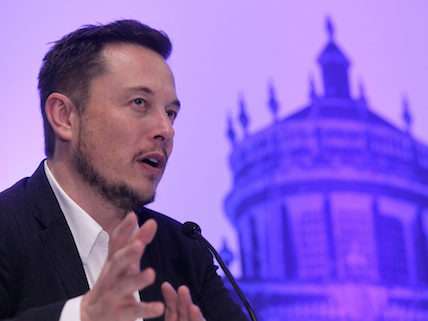Will Elon Musk Launch for Mars off the Backs of Taxpayers?
Musk is no stranger to cozy relations with federal and state governments.


Elon Musk delivered a much-anticipated speech Tuesday at the 67th International Astronautical Congress in Guadalajara, Mexico, where he laid out his vision for colonizing Mars. There's no doubt that taming our celestial neighbor would be a testament to human innovation and determination. Today, however, it might be more impressive if Musk could provide a vision for how his companies can succeed here on Earth first, especially without heavy reliance on taxpayer support.
SpaceX, founded by Musk in 2002, has never hid its ambition to one day enable people to live on other planets. In the meantime, the company has relied on income from the more mundane business of launching payloads into space with its Falcon 9 rockets. Earlier this year, SpaceX won an $82.7 million Air Force contract by promising to save taxpayers millions of dollars. (The bid was 40 percent less than what the government had estimated the mission would cost.) Cost savings are great, but only if they materialize. It's too soon to tell, but as of now, the probability isn't zero that SpaceX's super-cheap launch cost will be illusory, especially if its rockets—and their expensive cargoes—keep blowing up.
Last month, a Falcon 9 rocket blew up on the launchpad, taking with it a $200 million communications satellite commissioned for Facebook. American taxpayers should be thankful it wasn't one of the Air Force launches. But now, with two major Falcon 9 explosions—the first occurring last year and costing NASA (i.e., taxpayers) $110 million—it's worth at least considering whether Musk sold the military a lemon.
Having won government support with the promise of cheaper launches—and with some backroom help from Sen. John McCain, who has a soft spot for his favorite liberal donor's American-made rockets—SpaceX hoped to continue gobbling up military contracts and add to the billions it's already making off NASA. But that plan is now in doubt, or at least it should be. Contractor competition is desirable, but with such expensive cargo on the line, any competent cost-benefit calculation has to compare the odds of catastrophic failure and not simply rely on the upfront bid price.
For instance, United Launch Alliance, the maker of the Atlas V, offered launch capacity for roughly $120 million, which is much more than SpaceX's $60 million. That said, ULA also has a sterling record of more than 100 launches with a perfect success rate. The cost of an explosion goes beyond the cost of another launch because it requires a time delay and the replacement of the cargo (some of which will be paid for by insurance). That means that consecutive explosions could very quickly add to the expense.
In other words, on the issue of cost, the jury is still out. Though the pressure put on the competition by Musk is a good thing and though ULA has definitely been challenged to look at its cost, taxpayers must still ask what would happen if the promised cost savings were not to materialize. Government isn't known to correct its mistakes when cost overruns occur. Of course, lawmakers can always hide behind the McCain argument that ULA's Atlas V is powered by a Russian RD-180 engine, which he believes creates a security risk. But many others, including those in the military, disagree that the switch is without cost and consequences.
Musk is no stranger to cozy relations with federal and state governments. All three of his companies have benefited heavily from taxpayers. Yet despite generous green energy handouts, his SolarCity is heavily indebted. He now wants to merge it with his electric car company, Tesla Motors, which also benefited from almost $1.3 billion in subsidies. Solidifying his crony credentials, the epitome of crony capitalism itself, the Export-Import Bank of the United States, has subsidized the payloads for numerous SpaceX launches. The Ex-Im Bank's chairman misrepresented this as support for "small business."
When it comes to colonizing Mars, it's easy to get swept up in Musk's vision. Commercial space flight has a bright future, but that future shouldn't be built on the backs of taxpayers. Yet it's hard to see how SpaceX is ready to self-finance such a bold mission without heavy government involvement.
There's no doubt that Musk is an impressive salesman and innovator. The government bought into his pitch of cheap rocket launches and rewarded him with lucrative contracts. Unfortunately, his low bid price may end up offset by the explosive tendencies of his rockets. Now that he has set his sights on Mars, let's hope—for the future of science and exploration—that he can avoid similar disasters and also that he has the courtesy to leave taxpayers out of it. We are already very busy paying higher interest on our giant debt and taxes.
COPYRIGHT 2016 CREATORS.COM


Show Comments (93)